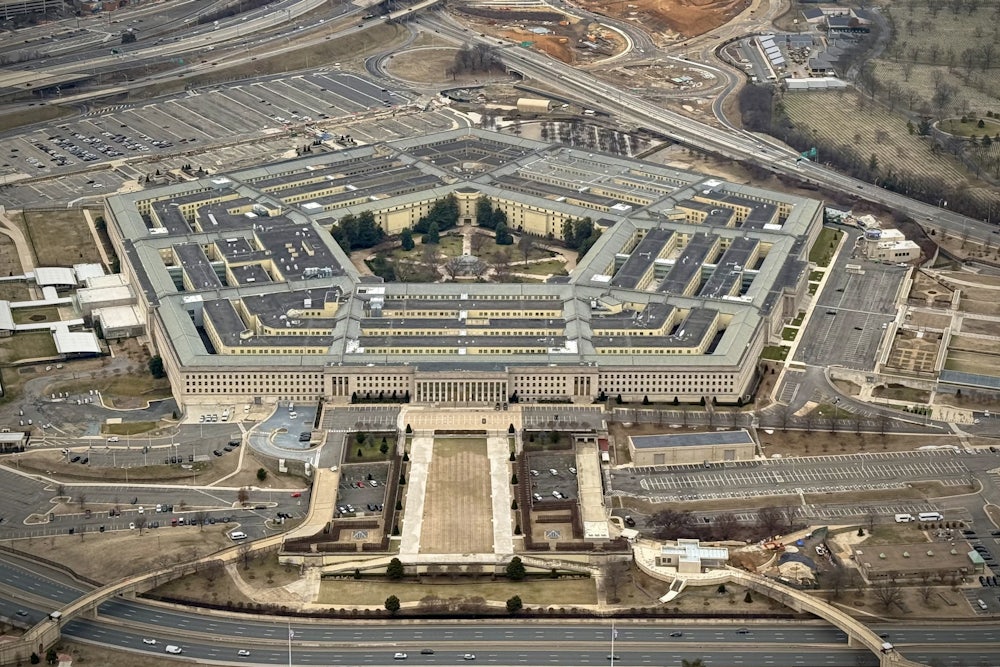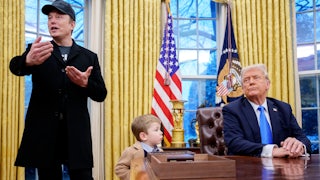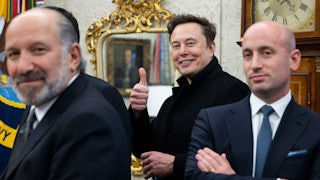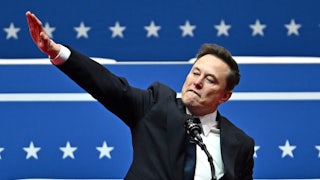Imagine a trillion-dollar publicly-traded company that was regularly in the news for corruption scandals, couldn’t account for a majority of its assets, and has never passed an audit. Shareholders would demand resignations. The SEC would launch investigations. Executives would be forced to resign. Yet, when it comes to the Pentagon, the largest line item in the federal discretionary budget, this persistent level of dysfunction has largely been met with indifference.
The Department of Defense, which commands an $850 billion budget, failed its seventh audit in a row in November. In fact, it’s the only major federal agency that has never passed one. If the Trump administration is really serious about reducing wasteful spending, Elon Musk’s Department of Government Efficiency would have spent the last month at the Pentagon, not the U.S. Agency for International Development.
A 2023 investigation by CBS found that private contractors, who receive about half of the department’s budget, overcharge the government on “almost everything.” War profiteering is nothing new, of course—it’s been a problem in the armed forces since the Civil War—but it’s gotten worse as decades of warnings from watchdog groups and government officials have gone unheeded.
Even a cursory look at the Pentagon’s budget would immediately reveal billions in waste and graft. In October, RTX, the massive defense contractor formerly known as Raytheon, was ordered to pay a $950 million settlement after overbilling the government by more than $100 million for Patriot missiles and a radar system. The following month, a Navy contractor was sentenced to 15 years in prison after bribing dozens of officials with cash, luxury items, and prostitutes in what amounted to one of the largest corruption scandals in American history. And that was just what came to light at the end of last year.
Stories of waste and corruption in the Pentagon have long been commonplace. The ones that have drawn the biggest headlines include: $52,000 trash cans; $14,000 toilet seats; $4,000 soap dispensers; $3,357 ball bearings; and $1,280 coffee cups. So why have government officials rushed to cut spending on social services, consumer protections, and foreign aid instead?
The simplest explanation is that the military budget is viewed as practically untouchable, even though everyone knows that fraud is rampant. Members of Congress are worried about taking on the Pentagon’s budget lest they be accused of endangering national security. The deep ties between the military and the corporate world only make cuts harder. Before taking office, Defense Secretaries Lloyd Austin, Mark Esper, and James Mattis had all previously sat on the boards of major defense contractors–companies that also spend hundreds of millions lobbying Congress, effectively guaranteeing that any reform efforts are dead on arrival. This self-reinforcing cycle between military, corporate, and congressional powers is known as the “iron triangle.”
Donald Trump, who has no ties to the defense industry and a deep loathing of the “Deep State” that he blames for undercutting his first presidential administration, may just be able to follow through on these reforms. In the past week, he has twice stated that DOGE will be examining the Pentagon budget. In a Super Bowl interview with Fox News, he teased an audit, saying he expects to find “hundreds of billions of dollars of fraud and abuse.” Defense Secretary Pete Hegseth, meanwhile, recently promised that “at a bare minimum” the Pentagon would pass a clean audit within four years and said DOGE was “welcome” at the Department.
While the full scale of corruption in the defense industry is unknown, the Congressional Budget Office has already compiled a list of options that would see more than a trillion dollars in savings over a ten-year period even without uncovering any fraud.
DOGE can play an important role in this long overdue project by overseeing the Pentagon’s existing audits, which have already cost nearly two billion dollars just to conduct. It can quickly and easily identify wasteful programs while making recommendations to streamline defense production and improve information technology systems. It can take a look at the 3.4 million service members and civilians that make it the world’s largest employer and help determine whether all of them are really needed, given the military’s current footprint. It can tell us things we should already know, like “do the armed forces need to own and operate 140 golf courses in order to keep us safe”?
Musk has already played an important role in drastically reducing the costs of space launches, via his SpaceX aeronautics company.
He’d be doing the nation a great service just by looking at Lockheed Martin’s troubled $1.7 trillion fighter jet program. (Just a couple of weeks ago, the company reached a $30 million settlement with the Justice Department over allegations that it overcharged the Pentagon for the F-35.)
One thing that is clear, however, is DOGE will have to be more deliberate than it has been thus far. For the sake of national security and democracy, a careful audit of the Pentagon cannot be done via the blitzkrieg approach the agency took at USAID. A project of this nature requires careful planning, as well as buy-in from members of Congress, who covet lucrative defense jobs in their districts and will be much harder to win over. Actual cuts to the defense budget are necessary but they can only be determined by Congress. Cutting waste will also mean putting an end to our forever wars and resisting nation-building projects like the one Trump has proposed in Palestine.
Should Trump and Musk decide that they’ll try an alternative to their move-fast-and-break-things approach, Pentagon reform may provide a rare moment of bipartisanship in the second Trump era and could even unite some on the MAGA right with the likes of Democratic senators Elizabeth Warren, and Bernie Sanders. Reforming the Pentagon and slashing the defense budget seems plausible for the first time in years. It’s still highly unlikely. For one thing, DOGE’s bid to dismantle the administrative state has been highly selective: Thus far it has only shown interest in bringing its slash and burn approach to departments engaged in work favored by liberals and Democrats, like USAID and the Consumer Financial Protection Bureau.
The dismantling of USAID and the CFPB was met with outrage. Efforts to root out fraud, let alone slash the defense budget, will inevitably lead to a confrontation with the powerful corporations that make up the military-industrial complex. Should a real audit take place, Trump will likely have to face the full weight of those companies and, in all likelihood, will quickly change course.
This would be an outrage, of course—and it would only further expose DOGE as an ideological project, rather than one devoted to rooting out bad spending and waste. USAID, which only accounts for 0.7 percent of the budget, is all but dead, while the Department of Education, is about to be put “into the wood chipper.” Pentagon spending, meanwhile, remains unaccounted for and continues to grow. At the same time, Israel will maintain its position as the largest recipient of foreign aid while food aid, humanitarian assistance, and HIV and malaria prevention programs will remain frozen.
If fiscal responsibility is truly the aim here, the Pentagon should have been DOGE’s first stop. There is still time, of course, though history suggests that even amid the promise of reform, the military budget’s status as the federal government’s sacred cow is hardly in danger.
Trump’s willingness to question Pentagon spending seems significant, but the deeper reality is that military contractors wield far more influence in Washington than any single man or administration could ever dream of.




